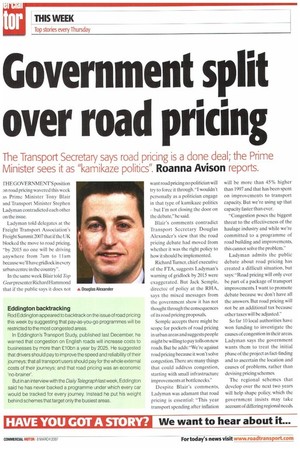Government split over road pricing
Page 6

If you've noticed an error in this article please click here to report it so we can fix it.
The Transport Secretary says road pricing is a done deal; the Prime Minister sees it as "kamikaze politics". Roanna Avison reports.
THE GOVERNMENT'S position an road pricing wavered this week as Prime Minister Tony Blair and Transport Minister Stephen Ladyman contradicted each other on the issue.
Ladyman told delegates at the Freight Transport Association's Freight Summit 2007 that if the UK blocked the move to road pricing, -by 2015 no one will be driving anywhere from 7am to 1 1 am because we'll have gridlock in every urban centre in the country-.
In the same week Blair told Top Gearpresenter Richard Hammond that if the public says it does not want road pricing no politician will try to force it through. "I wouldn't personally as a politician engage in that type of kamikaze politics but I'm not closing the door on the debate," he said.
Blair's comments contradict Transport Secretary Douglas Alexander's view that the road pricing debate had moved from whether it was the right policy to how it should be implemented.
Richard Turner, chief executive of the FTA, suggests Ladyman's warning of gridlock by 2015 were exaggerated. But Jack Semple, director of policy at the RHA, says the mixed messages from the government show it has not thought through the consequences of its road pricing proposals.
Semple accepts there might be scope for pockets of road pricing in urban areas and suggests people might be willing to pay tolls on new roads. But he adds: "We're against road pricing because it won't solve congestion.There are many things that could address congestion, starting with small infrastructure improvements at bottlenecks."
Despite Blair's comments, Ladyman was adamant that road pricing is essential: "This year transport spending after inflation will be more than 45% higher than 1997 and that has been spent on improvements to transport capacity. But we're using up that capacity faster than ever.
"Congestion poses the biggest threat to the effectiveness of the haulage industry and while we're committed to a programme of road building and improvements, this cannot solve the problem."
Ladyman admits the public debate about road pricing has created a difficult situation, but says: "Road pricing will only ever be part of a package of transport improvements. I want to promote debate because we don't have all the answers. But road pricing will not be an additional tax because other taxes will be adjusted."
So far 10 local authorities have won funding to investigate the causes of congestion in their areas. Ladyman says the government wants them to treat the initial phase of the project as fact-finding and to ascertain the location and causes of problems, rather than devising pricing schemes.
The regional schemes that develop over the next two years will help shape policy, which the government insists may take account of differing regional needs..






















































































































































































